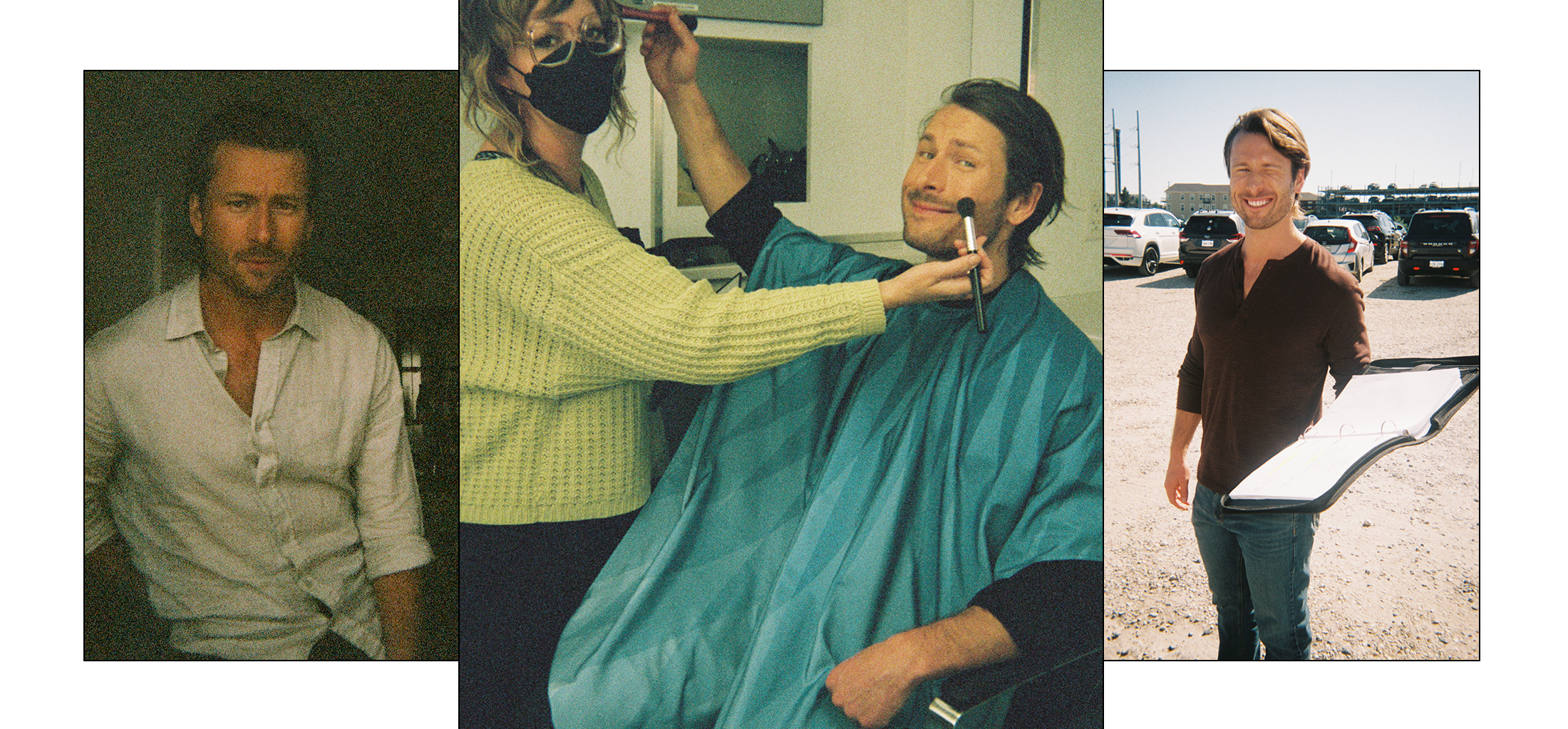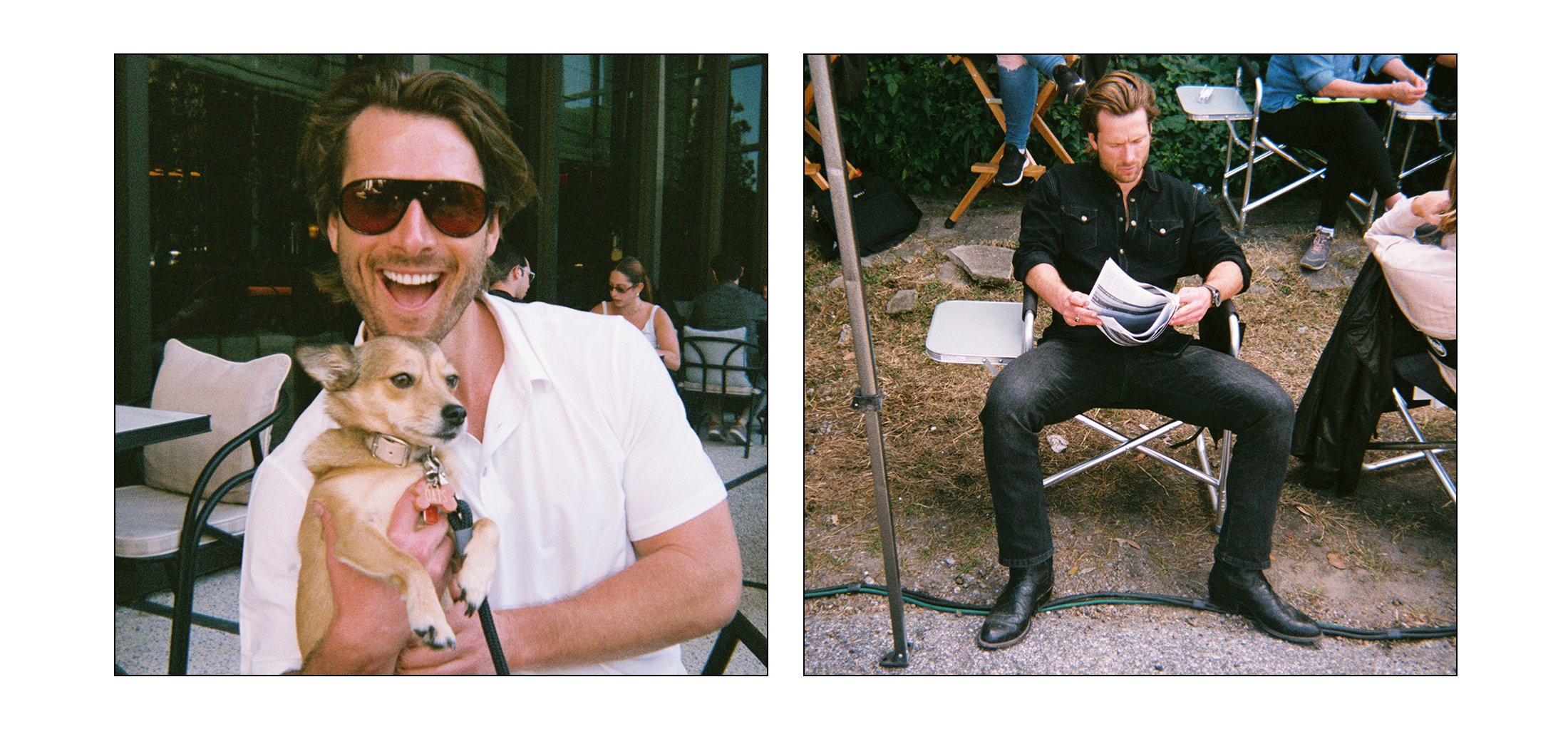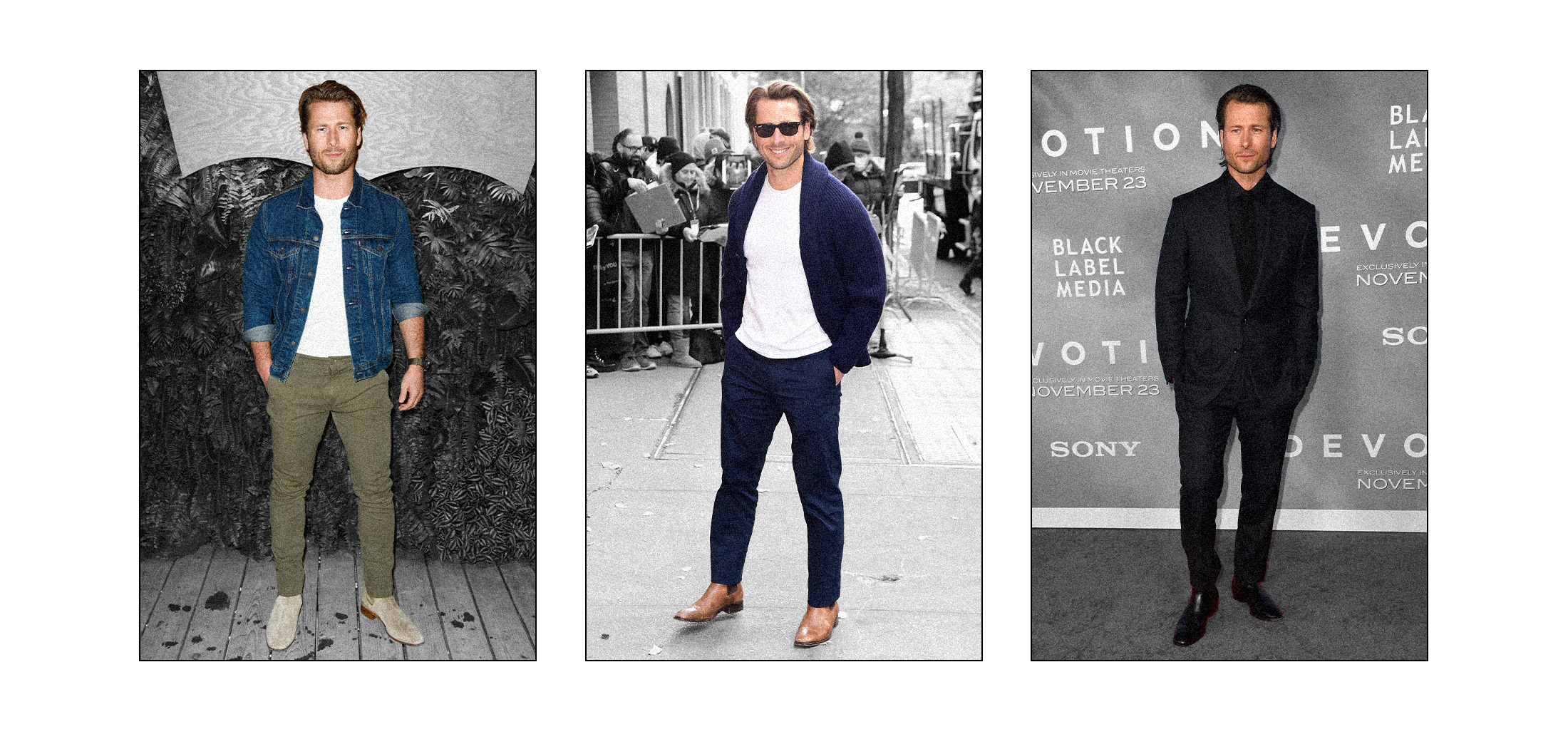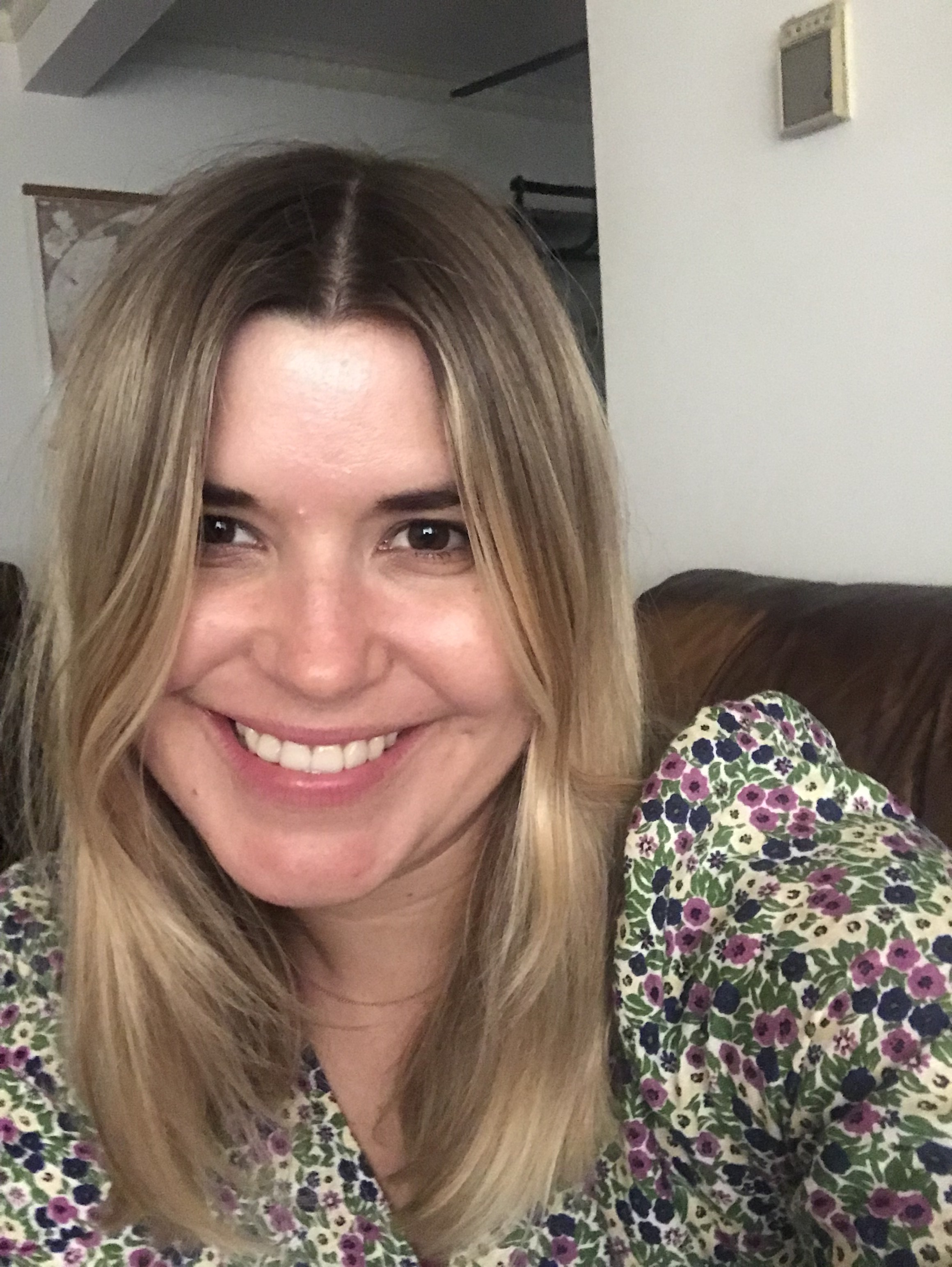Glen Powell Has the Secret to Any Great Outfit


Welcome to Boys on Film, a series where we turn the spotlight on some of the most talented and stylish men in music, film, television, and fashion. Through an exclusive shoot and interview, we’ll give you a taste of how these men dress and what personal style means to them.
"When most people leave this movie, they are in a puddle of tears,” Glen Powell says of his latest film Devotion, which landed in theaters last week. I can attest to this fact, having left a screening at Sony Studios with my eyes swollen and mascara running down my face. It was not a pretty sight. The story of Tom Hudner and Jesse Brown, two naval aviators who form an unexpected friendship and deep bond during their time serving in the oft-forgotten Korean War, will have that effect on you. It did on Powell, who—after reading the book on which the film is based, Devotion: An Epic Story of Heroism, Friendship, and Sacrifice—convinced Black Label Media to option the rights. It was the ultimate passion project for the 34-year-old actor and producer, and with the Hudner and Brown families looking on, the stakes were high.
This happens to be a particularly unique year for Powell, who had not one but two high-profile aviator films on the docket. First came Top Gun: Maverick, the record-breaking follow-up to the beloved 1986 Tom Cruise action flick, in which he played the story’s cavalier bad boy Hangman. Now comes Devotion, a Korean War drama in which he plays naval officer and medal of honor recipient Tom Hudner. One might hesitate at the idea of doing two aviator films so close together, albeit set in vastly different time periods, but getting to do both was a dream scenario for Powell. "It’s been the best year of my life,” he says.
Things aren’t slowing down for the actor either. He just wrapped filming the Richard Linklater project Hitman in New Orleans and is in pre-production on Most Dangerous Game, where he will reteam with Zoey Deutch. (The two starred in the 2018 Netflix comedy Set It Up.) I caught up with the actor during a rare break from work to talk about bringing Devotion to the big screen, his hilarious "steam and pitch” with co-star Jonathan Majors, and his secret weapon to mastering any outfit. Trust me—it’s a conversation not to be missed.

I was scrolling Instagram and came across a headline that stopped me dead in my tracks: "Jonathan Majors Made Glen Powell Pitch Him Devotion While Completely Naked in a Russian Bathhouse.” I need to know more. How did this happen?
What’s so crazy about that headline? That doesn’t seem that crazy. I guess I’ve just been pitching that way my whole career, and finally, somebody wrote about it. No, the funniest part of that… Well, there are two parts to that story. One is that I knew that I wanted Jonathan Majors to star in this, and I’m such a fan of his work that I was like, "Where can I meet Jonathan?” And they said, "Go to New York.” So I was like, "Okay, cool. I’ll meet him in New York. Where does he want to meet?” And they said there is this bathhouse. I think it was in the West Village or something like that, and I was like, "Alright, cool.” They were like, "Is that okay?” And I was like, "Yeah, sure. That sounds fun. We will steam and pitch.” So it was really funny in the fact that we walk into this Russian bathhouse, and yes, very quickly you get completely undressed. I think two minutes into knowing each other we were completely naked. Did I pitch him naked the whole time? No. But were there times we were talking about the movie while [naked]? Yeah, sure. It bonds you together. It’s all honesty. It’s all on the table—metaphorically, literally, the whole thing. It was an appropriate start to our relationship. We had to be in the trenches together, so you might as well just put it all out there and know who you are in the trenches with, I guess.
Amazing! So it’s safe to say Devotion wouldn’t have happened without you. You were the one to recommend Black Label Media option the rights to the 2014 book Devotion: An Epic Story of Heroism, Friendship, and Sacrifice about the friendship between naval officers Jesse Brown and Tom Hudner during the Korean War. Why were you so invested in bringing Brown and Hudner’s story to the big screen?
First off, it was a story nobody knew about that I thought was such a beautiful story of how far you are willing to go for a wingman. Also, my grandfather was a Korean War veteran, and there were no movies that had been made about it. It’s literally a forgotten war. Nobody talks about the Korean War. So to do service to every person wearing uniform during that time period, I think [it] is really important. But I also think the racial conversation that happened because of this movie [is important]. When I read the script or when I read the book, I immediately was like, "What a complicated relationship between these two men.” It was one that didn’t boil down racial dynamics like a lot of movies in the ’90s or early 2000s did, where it simplified it down to "Oh, I didn’t like you, but now, I like you.” There was something so modern about the story. For instance, modern-day racial conversations. During the Black Lives Matter protests, it was "Post a black square,” and I was like, "What does that do?” Solidarity is such an important thing, but how do we do it in a way that’s real? How do we put skin in the game? How do we change the conversation? All of these things are at a much different level than just things that make you complicit or things that make you not feel guilty. And this movie felt like all those things that were going on in my head and conversations I was having with different friends. It really felt like it explored a modern-day conversation with a classic friendship. And I think that’s what drew me to the story, and over the course of developing it, the nuances of it just became more and more exciting. I’m really proud of what it is and how it exists.
How did you come across the original book?
I had a friend that recommended the book to me, and then my uncle recommended the book to me, and I ended up reading it on this fishing trip with my family. We all ended up reading it and being like, "Wow, there is a movie here.” And the more I thought about it, it’s not an obvious movie because the ending is a certain thing and the dynamic between the two of them. They are not like best friends, but they are really like soulmates, and the Korean War is not necessarily like a war that a studio goes, "Let’s make a movie about the Korean War!” So there were all these kinds of things against it, and that, for me, was when it started feeling more obvious—when the chips are down. When something is too obvious, sometimes it blends in with the filmography of every other thing, and it doesn’t rise to challenge the filmmakers or the actors to make something special. And because there were so many things against this, I go, "Everybody on board is going to have to rise to the occasion to make this thing really special,” and everybody did.
You play Tom Hudner and actually had a chance to meet with him shortly before he passed away. How did your meeting with him influence your role as a producer on the film and your portrayal on-screen?
It’s a really great question because it’s really tough to meet the person you are playing. I’ve played real-life people before, but I think this is the only time I’ve actually gotten to meet the person I’m playing. And to look a family in the eyes—the Hudner family, the Brown family, Tom Hudner himself—and say, "If you give me the rights to this book and your life, I’ll tell the story correctly,” it’s a promise that you just hope you are able to keep, and it really does put a lot of pressure on you to do it right.
In terms of the character, you actually have to separate yourself a little bit. I’ve become such great friends with the Browns and the Hudners, but you really have to separate yourself and go, "This was a man who was flawed. This is a man who had insecurities and wants and needs and was disappointing to people close to him and all these things.” That’s what you have to do as an actor. You have to throw rocks at your characters, and because I love this man so much, you don’t want to throw rocks at him. But if you don’t throw rocks at him, you don’t have a movie. So it really made it very interesting and complicated to play, but [Tom] Cruise on Top Gun always said this one phrase that has really become a big compass for me, which is "pressure is a privilege.” When you make something that has a lot of pressure on it, especially something with familial pressure [and the] pressure you are putting on yourself to tell the story right, it means you are doing something right. Showing this movie to those families was so nerve-racking for me. They loved it. They are obsessed with it and such supporters of it. But it’s a thing. This is the legacy of these two men, and to show that on-screen in front of the world was more naked than I felt in front of Jonathan Majors at a bathhouse.

Going back to Jonathan Majors, why did you want him for the role of Jesse Brown?
I don’t know if you have ever seen this movie The Last Black Man in San Francisco. It is a very good movie, but Jonathan is exceptional in it. And as we were looking for actors who could potentially play Jesse Brown, again, I was holding this thing. It’s like if you are looking for the person you are going to spend the rest of your life with. This project meant so much to me. That’s how I was feeling while searching for Jesse Brown. And when I saw that movie, I thought, "This is a guy who has depth and range and a brain who can explore parts of Jesse Brown that nobody else knew.” He’s a guy I think we are going to be talking about him for a long time. The guy is going to be on the Mount Rushmore of great actors. When it comes to Jesse Brown, who is the first African American naval aviator, you look at a guy who nobody really knew what he was going through and to what degree. We do have a journal and some of those things to pull from. When you meet Jonathan, he’s such an athlete. He’s competitive. He’s such a guy’s guy, but he’s also this sensitive soul and so in tune and so well read and so thoughtful about everything that this character could have played into a lot of tropes, and he just subverted what could of been a very normal performance, and he made it dynamic and real.
Jesse and Tom have a deep emotional bond and special friendship. Did you and Jonathan feel that pretty quickly?
It’s so funny because there’s ebbs and flows of this movie, but we really wanted to stay as Tom Hudner and Jesse Brown. [Jonathan] is very method, so he never dropped the character from start to finish in the movie, and we only hung out to preserve what happens on-screen. We never hung out off-screen. But what we would do is send poems back and forth to each about whatever the scene would be for that week. We would send certain poems that would relate to that. This is the book he actually gave me right before the shoot, and it’s called Devotions [by Mary Oliver]. We would mark up certain things and send them to each other. And the way J.D. Dillard, who is the director [of Devotion], actually sees movies is he believes they are actually almost a long-form poem, and each scene is its own bit of poetry. So we would try and get on the same page. We would send music to each other if we’re on the same page. If not, we wouldn’t talk that day. And it was really interesting. I told [Jonathan] this in the bathhouse: I said, "When it comes to performance, we will do whatever it takes to get the performance.” I said, "I’m not offendable. I don’t care if we are best friends. If you like me [or] you don’t like me, we’ll do whatever it takes to get the performance right.” And I said, "As long as you and I are on the same page and nobody’s getting hurt, we will do it. But we just have to be on the same page. You can’t be abusive and call it method acting,” which some people do. They’re just dicks, and it’s like you are not actually a method actor. You’re just an asshole. But he really was, start to finish, Jesse Brown. It’s really nice to be in the trenches with a guy who really cares that much, because I really care that much, and this thing meant so much to me. This story means so much to me that I wanted someone who felt that same accountability and that same importance to doing the story and doing it right.
Earlier this year, you starred in a little film called Top Gun: Maverick. Did you have any hesitations about doing two aviator films so close together?
I actually developed Devotion before Top Gun was made. I had the script for Devotion already going, the producers were on board, we had a lot of momentum, and then I started auditioning for Top Gun. When I didn’t get the Rooster role and got offered the Hangman role, I had to make a big decision. … Should I just do Devotion? And Tom Cruise was the one who—and I’m so grateful—got me to do both. But I had to ask the Black Label producers, the producers of Devotion, and Tom Cruise, "Hey, can I do both, guys?” And I really did feel so torn about it. Top Gun is a movie I’ve wanted to make my entire life, and Devotion is a movie that I really put my heart and soul into and made promises to families to do, so being caught in the middle of that was really tough. But the fact that I got to do both, it’s been the best year of my life.
I know with Top Gun you got to fly in actual F/A-18s, and you have your pilot’s license now. Have you flown on your own outside of working on these projects?
Absolutely. I have been flying all over the place. I’ve been to Napa. Palm Springs is great. I go to Austin every once in a while. I’ve flown out to Scottsdale for golf. That’s been fun. Flew out to Vegas. Not as fun. Don’t like that weather. But yeah, I’ve been really using the pilot’s license, and it’s been wonderful. There’s a great sense of freedom when you are flying yourself around. It’s also, for me, meditative being up there all on my own listening to music. The world is your oyster when you are a pilot in command.

For our Boys on Film franchise, we sent you some disposable cameras and let you take free rein with the imagery and wardrobe. What did you want to convey about your style through these images?
What I think is indicative about these photos… I have not seen them, so I don’t know what exactly they are, but I do remember taking them. I think what it feels like is we had about five to 10 minutes. I was shooting a Linklater movie in New Orleans. I flew into Atlanta for some press. I immediately landed and went straight into press, and I think this was the only 10-minute break I had, and I threw on my clothes, jumped around for a bit and enjoyed my life, and then went right back to press. I will say that, for me, the clothes that I chose… I don’t know if you know Warren Alfie Baker, my stylist, but I told him, "If I feel like I’m a little doll you’re dressing up, I’m going to lose my mind.” I’m all about comfort. I have to feel like myself. So most of the things I wear are pretty casual, comfortable things. I’m a pretty relaxed dude that doesn’t take much seriously. I work hard at my job, but on the fashion side, if I don’t feel comfortable, I’m not comfortable. So all of the stuff you’re seeing is all pretty fun, casual stuff that I can jump around on a couch wearing.
It’s suits on the red carpet, but what about off-duty?
This [that I’m wearing] is a little crew with a little of that. This [white tank] is the secret weapon. You put this on under anything, and it looks like you are dressing up even though you’re not. I would say I’m really into the button-down thing. A loose button-down, even short sleeves, dresses things up. Love that. One thing that I’m actually realizing is super important is tailoring. Tailoring can get you really far. I have a suit in my closet that probably costs less than $100, and I get so many compliments on it. It’s just tailored well. So yeah, that is the secret weapon—be comfortable. The layering and things like that. If you’re comfortable, other people are. Most people aren’t paying attention to your wardrobe as much as you are.
Last question. What was your first big designer purchase, and do you still have it or wear it?
Oh, good question. My first big designer purchase, I believe it was a Valentino suit that I wore and was so obsessed with it. Now, Valentino actually gave me a suit, so it all balanced out. But it was this red suit that I wore for Hidden Figures, and I ended up buying it, and I think that was my first suit purchase that I did for myself that felt a little tight, especially when you don’t get paid a lot of money to act. But I loved the suit so much and loved how I felt in it so much. You got to double down on that feeling.
Devotion is now playing theaters.

Jessica Baker has 16 years of experience in the digital editorial fashion and entertainment space. She is currently the Executive Director, Entertainment at Who What Wear where she ideates, books, writes, and edits celebrity and entertainment features.